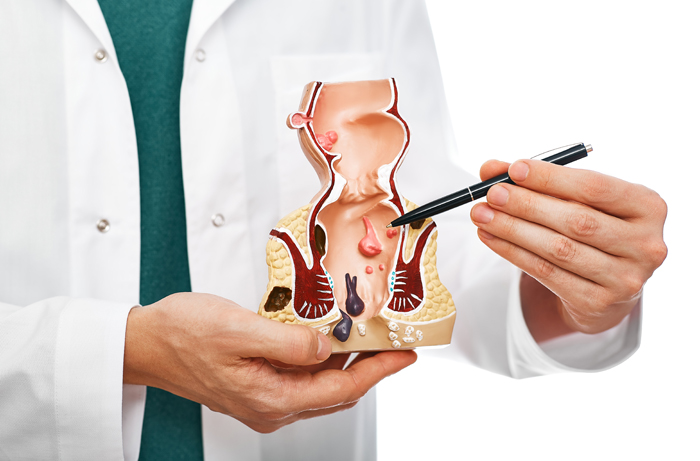Anal Fissures Treatment & Surgery in MRC Nagar, Chennai
What are Anal Fissures?
Anal Fissure is a small tear in the lines of the anus. An anal fissure occurs when you pass large or hard stools that cause pain and bleeding during the bowel movement. Additionally, you may also experience spasms in the ring muscle at the end of the anus.

What are the Types of Anal Fissures?
Anal fissures can be classified as below:
- An acute anal fissure is one of the most common anal fissures, as it usually appears with clear edges. It gets healed within six weeks.
- A chronic anal fissure is deeper than an acute anal fissure and is associated with an external tag. It usually persists for six weeks, and recurrence of chronic anal fissure is common.
What are the Symptoms of Anal Fissures?
Some of the common signs of anal fissures are -
- Severe pain during bowel movement
- Pain after a bowel movement
- Bleeding during bowel movement
- Visibly the skin cracks around the anus
- A small lump near the anal fissure
What Causes Anal Fissures?
Some of the common factors that cause anal fissures are -
- Passing large stools
- Passing hard stools
- Childbirth
- Anal intercourse
- Chronic diarrhea
- Straining at the time of bowel movement
- Constipation
Some of the less common causes are HIV, tuberculosis, anal cancer, syphilis, and others.
When to See a Doctor
If you have pain during bowel movements or witness blood on stools, you should immediately get in touch with your physician.
Request an Appointment at Apollo Spectra Hospitals, MRC Nagar, Chennai
Call 1860 500 2244 to book an appointment.
What are the Risk Factors Associated with Anal Fissures?
Some of the risk factors that would lead to a rise in the risk of developing anal fissures are -
- Constipation - Passing hard stools increases the risk of developing anal fissures
- Childbirth - Anal fissures are common among women after childbirth
- Anal intercourse
- Age - It may occur at any age; however, it is common among infants
- Crohn’s disease - Chronic inflammation of the intestinal tract would increase the risk of developing an anal fissure
What are the Complications of Anal Fissures?
The complications associated with anal fissures are as follows:
- Recurrence - If you have experienced an anal fissure earlier, then there is a possibility of you getting diagnosed with the same.
- Tear extends to surrounding muscles - Anal fissure may extend to the ring muscle, leading to anus closed, making it more difficult for the fissure to heal.
- Failure to heal - Fissure that is not healed in eight weeks may need additional treatment.
How Can We Prevent Anal Fissures?
Anal fissures can be prevented by considering some measures to prevent diarrhea and constipation. Additionally, you can include high-fiber foods in your diet, exercise regularly, and drink fluids to prevent anal fissures.
How are Anal Fissures Treated?
Anal fissures are usually treated by making some changes in your lifestyle and dietary changes. However, if the symptoms persist, the treatment would include surgical and non-surgical treatments depending on the condition.
The surgical treatment for anal fissure is Lateral Internal Sphincterotomy (LIS).
Some of the non-surgical treatment options would include -
- Topical creams (Anesthetic)
- Blood pressure medications
- Externally applied Rectiv (Nitroglycerin)
- Botulinum toxin type A injection
Conclusion
Anal fissures are very common among infants but may affect people of any age. An anal fissure is a cut on the lining of the anus. The tear in the skin leads to severe pain during and after the bowel movements. Some of the common and simple treatments for anal fissures are increased consumption of fiber and medications.
After a physical examination and understanding medical history, the doctor would ask for further analysis if they find another disorder such as Crohn’s disease during the examination. Some of the tests prescribed for the diagnosis of such a condition are flexible sigmoidoscopy, anoscopy, and colonoscopy.
Some of the lifestyle changes that would help you to get relief from the pain are -
- Include fiber in your diet
- Consume an adequate quantity of fluids to prevent constipation
- Avoid straining at the time of bowel movements
- In infants, you need to change the diapers frequently
Some of the home treatment options for anal fissure are hip baths (sitz baths), sit on a warm heating pad, and sitting on a warm water bottle as it helps to increase blood flow in the area.
Anal ulcer, anal tear, rectal fissure, and fissure in ano are some of the other names associated with anal fissure.
Symptoms
Treatments
Our Top Specialities
NOTICE BOARD
CONTACT US
CONTACT US
 Book Appointment
Book Appointment


.svg)
.svg)
.svg)
.svg)








